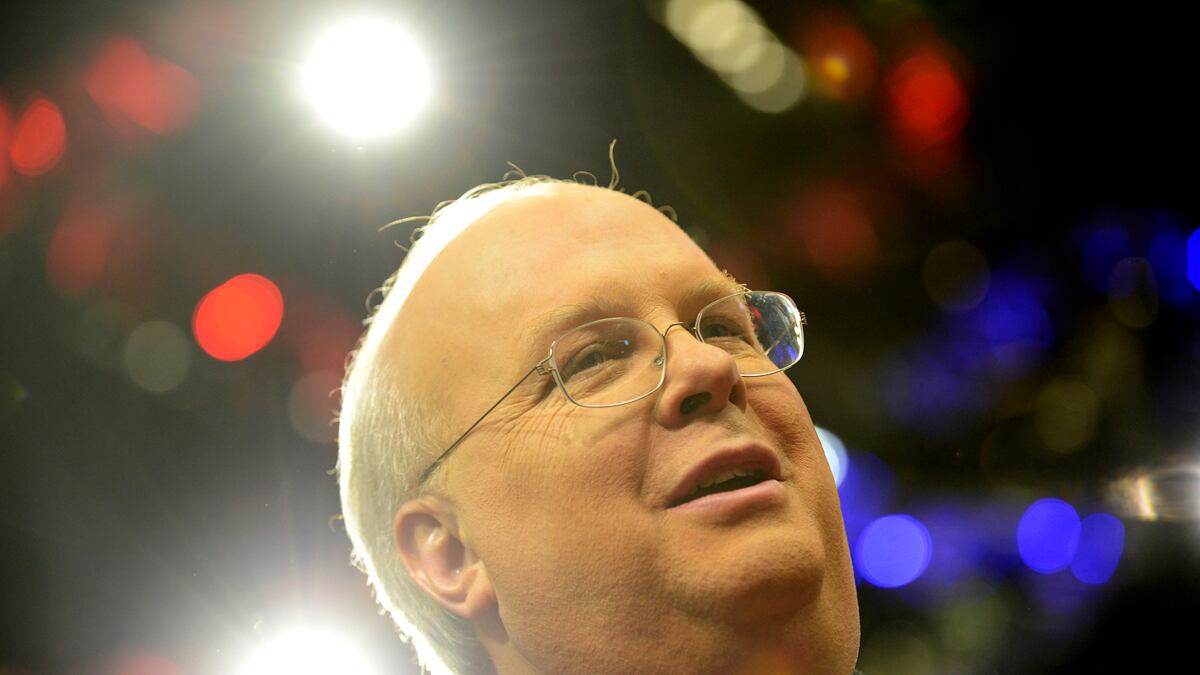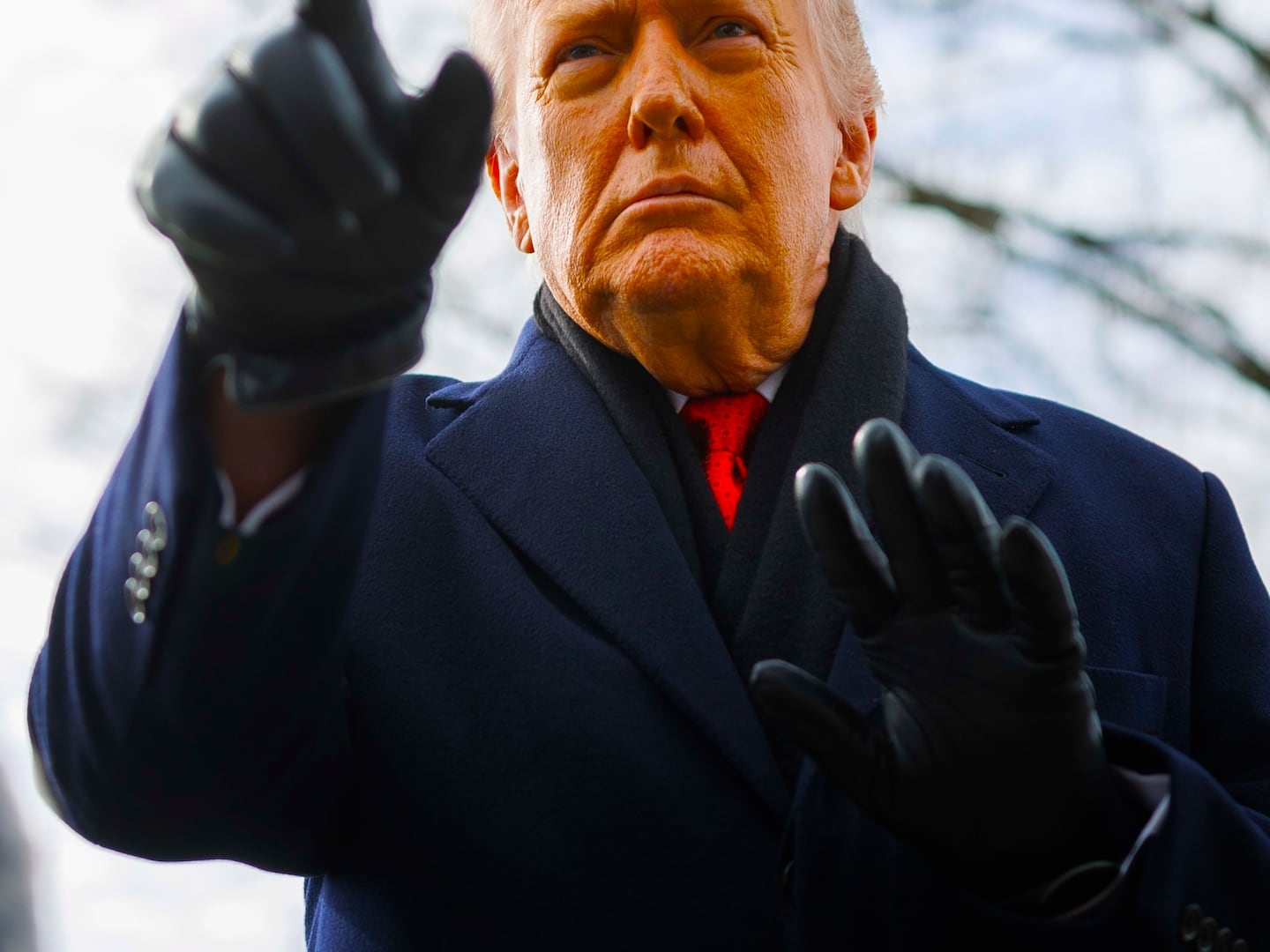It’s hard to believe, but Karl Rove, the dark prince of the Republican super PACs and so much more, may actually have had some sincere advice for President Obama on Monday morning.

Obama needs to slow down, Rove said. Specifically, the president should cut back on campaigning and raising money, he suggested—possibly out of the Texas operative’s well-known sense of fair play and simple human kindness.
Then again, maybe not.
“The president is exhausted,” Rove told a gathering at Politico’s Convention Playbook Breakfast in Tampa. “There’s a reason he stood up and said ‘if you built a business, you didn’t do that’”—a reference to Obama’s gaffe last month in Roanoke, Va., which is a major GOP talking point this week as the party faithful prepare to formally designate Mitt Romney as the standard-bearer who will attempt to eat Obama’s lunch. “Because he’s tired,” Rove went on. “Two hundred and five fundraisers! I’m just in shock—205 and counting.”
The 61-year-old Rove, the famed “architect” of George W. Bush’s rise from failed congressional candidate to two-term president, was by turns combative, erudite, tendentious, and hilarious under sharp questioning from Politico’s Mike Allen, the distributor of the daily Playbook email that is crack to the nation’s political junkies, and a cluster of inquiring media elite.
In the middle of the hourlong session, the silver-haired Rove—looking sleek as a seal in a blue blazer and orange tie—got into an extended quarrel with Vanity Fair writer Craig Unger, whose soon-to-be published book, Boss Rove, argues that since quitting the Bush White House as deputy chief of staff in fall 2009, Rove has become the effective head of the GOP.
When Unger took the microphone and identified himself, the Texan responded with a Rovian sneer, “Yes, of course you are.”
“And I also have a book coming out next week ...” Unger added.
“This is where Unger’s gonna flack his book,” Rove snickered to the audience of around 100 breakfasters. “Go ahead, Unger! Launch away!”
Unger asked if Rove’s criticism of a long string of Republican primary candidates or wannabes—everyone from Sarah Palin to Donald Trump to Rick Santorum to Herman Cain—was made in consultation with Fox News chairman Roger Ailes in order to help Romney’s campaign.
“No and no,” Rove replied. “And I was complimentary of some of those same people at different times.” He added: “Unger’s got an interesting book: I’m responsible for the murder of Mike Connell,” a computer consultant who had done work for Rove before dying in a December 2008 plane crash.
“The book does not say that,” Unger shot back.
“It’s very artfully close to saying that,” Rove insisted. “He also depends upon a nut ... who claims that I personally got her to investigate Governor Siegelman of Alabama,” Rove continued, referring to Democrat Don Siegelman, who was jailed after being convicted of campaign violations—a federal prosecution that many Democrats believe Rove encouraged.
“You’re misrepresenting,” Unger protested.
“No, I’m not.”
“Yes, you are.”
And so it went.
In other news, Rove contradicted Romney’s refusal to reveal himself to the voting public up close and personal (stated as recently as a Politico interview published Monday in which the presumptive Republican nominee, like Popeye, repeatedly declared, “I am who I am” (much as another former Massachusetts governor, Michael Dukakis, did in 1988) and claimed he didn’t care whether people liked him. “I know there are some people who do a very good job acting and pretend they’re something they’re not,” Romney said. “You get what you see. I am who I am.”)
Rove, on the other hand, warned that undecided voters, especially, need a sense of the private Mitt. Most voters have already made up their minds, Rove said, but “the final tranche of voters really don’t know as much about Mitt Romney as they know about Barack Obama ... They’ll hear a lot about tax cuts, economic plans and Medicare-reform packages and blah blah blah blah,” Rove said, “and that matters a lot to them. But they also wanna know: ‘Who is this person who is asking me to give them their vote to occupy the most consequential office in our country?’”
Rove said the candidates’ wives “do have a big impact” on how voters perceive the candidates. “Michelle Obama, I thought, was a very effective advocate in 2008 in a way that most people don’t recognize,” Rove said, “in that she was in charge of outreach to military families”—especially in traditionally Republican states that Obama won four years ago, such as North Carolina and Virginia. “It was powerful ... The president is a little bit different than almost any other office. We wanna know a lot about him, and one of things we wanna know about them is their spouse. The outspokenness of Barbara Bush was a plus. The concern for the common man and woman of Eleanor Roosevelt was a plus.” (In June, Rove married his third wife, Texas lobbyist Karen Johnson.)
Not surprisingly, he was sanguine about Romney’s chances for victory this November, and predicted that Obama will lose several states that he won last time, including North Carolina and Indiana—and will have a difficult challenge holding Wisconsin, home state of Romney’s running mate, House Budget Committee chairman Paul Ryan.
Rove claimed to be “mystified” about how the president’s top strategists, such as David Axelrod and David Plouffe, are running the reelection campaign.
“Obama has not laid out what he will do in the next four years,” Rove argued. “This campaign has not been about ‘here’s what I’ve done and here’s what I’m gonna do.’ It’s been about ‘my opponent is a weird, rich, vampire capitalist who cannot be trusted anywhere near anything that has to do with your pocketbook because he will steal your money and send it to a Swiss bank account.’”
Rove—who favored his audience with a shouted, guttural impression of frequent debate opponent James Carville—allowed that his own bank account has swelled significantly since his departure from government service.
“I do pay a higher effective tax rate than President Obama. And I do make more charitable contributions as a percentage of my income than either he or the vice president,” Rove said. “Of course, that’s not hard when you’re comparing it to Vice President Biden,” whose reported contributions on tax returns have been characterized by Republicans as notably stingy—well under $1,000 most years. “I think he’s getting his tips on charitable contributions from Hillary Clinton, pre-1992. ‘Mark up the underwear and give it away to Good Will!’”






